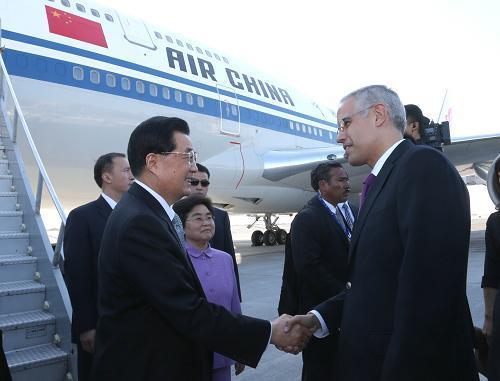Hu in Los Cabos for G20 summit
 0 Comment(s)
0 Comment(s) Print
Print E-mail Xinhua, June 17, 2012
E-mail Xinhua, June 17, 2012
Chinese President Hu Jintao arrived in the Mexican resort city of Los Cabos on Saturday for a G20 summit, which will focus on global growth and stability.
|
|
|
Chinese President Hu Jintao (L)?arrived in the Mexican resort city of Los Cabos on Saturday for a G20 summit. [Xinhua] |
At the seventh G20 summit, Hu, who participated in all the previous six meetings, is expected to expound China's views on the issues to be discussed by the G20 leaders.
According to the summit agenda, Hu and other leaders will exchange views on the global economic situation, the strengthening of the financial system, development, trade and employment.
The Los Cabos summit convenes at a time when the global economy is facing great risks to growth and stability. The euro-zone debt crisis, slowdowns in major developed nations and even in emerging economies, and high unemployment in parts of the world are all posing threats to a weak recovery.
Speaking at a press briefing Monday, Chinese Vice Foreign Minister Cui Tiankai expressed the hope that the G20 summit would continue to promote economic growth and stability against the backdrop of the volatile world economic situation.
President Felipe Calderon of Mexico, which is hosting the G20 summit, said last month that the first priority on the Mexican agenda is "to establish measures to bring about economic stability and create growth, and to put an end to this crisis."
Mexico has established priorities on the G20 agenda, including economic stabilization and structural reforms as foundations for growth and employment, strengthening the financial system, enhancing food security, and promoting sustainable development, green growth and the fight against climate change.
Analysts said that five years after the outbreak of the international financial crisis, global recovery is now on track, but risks to global growth remain. The major task of the Los Cabos summit is to work out policies to ensure global growth and employment, they said.
The G20 was created in December 1999 in response to the financial crisis affecting the emerging countries in the late 1990s.
Confronted with a global financial crisis, heads of states and governments of G20 members met for the first time in Washington in November 2008 to work out an action plan to prevent the financial system and the global economy from collapsing.
Since then, leaders of the G20 members have met regularly: in London in April 2009, Pittsburgh in September 2009, Toronto in June 2010, Seoul in November 2010, and Cannes in November 2011.
At the last summit in Cannes, specific measures were agreed upon under the Cannes Action Plan for Growth and Jobs in order to ensure global economic growth. The leaders made progress in reforming the international monetary system, and the euro-zone crisis was also a key topic of discussion.
The G20, which accounts for 90 percent of global output and two thirds of the world's population, has become the premier forum for economic and financial cooperation.
G20 members are Argentina, Australia, Brazil, Canada, China, France, Germany, India, Indonesia, Italy, Japan, Mexico, Russia, Saudi Arabia, South Africa, South Korea, Turkey, the United Kingdom, the United States and the European Union.






